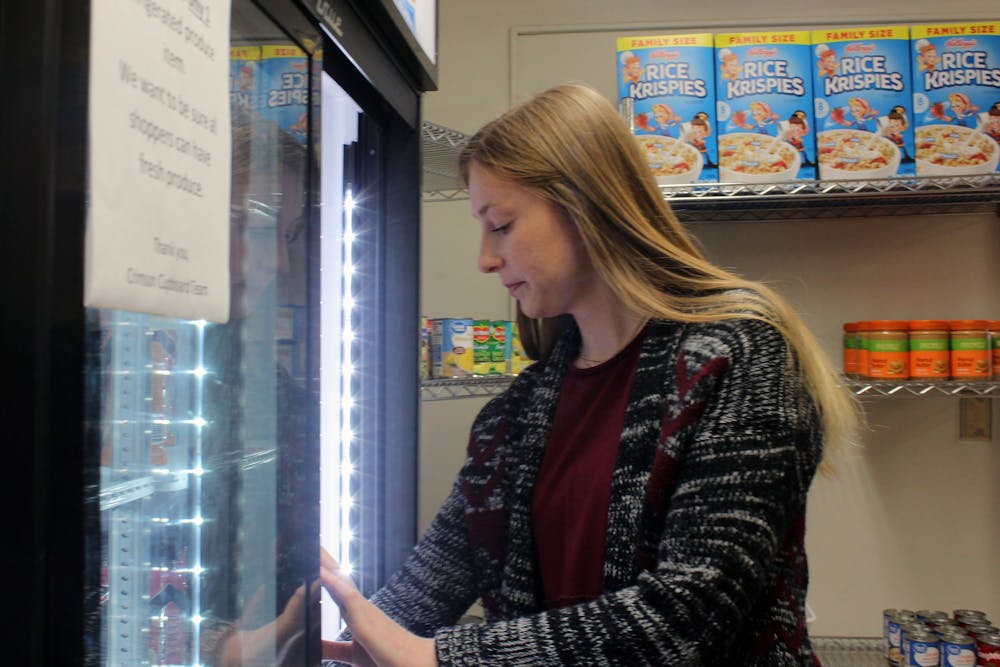Crimson Cupboard Food Pantry, a free food pantry for IU students, has experienced an influx of shoppers this past year as food inflation rises and millions around the country struggle to afford daily necessities.
Crimson Cupboard’s main location is located inside Campus View Apartments on North Union Street. Crimson Cupboard also opened a satellite location last semester in the Indiana Memorial Union, located next to the Biddle Hotel lobby. The food pantry is available to all IU students and members of the Bloomington community.
The pantry is a safe place for those in need, Edith Martinez, graduate worker at Crimson Cupboard, said.
“Shoppers came to get the things they need, but they also have found a friendship here,” Martinez said.
Crimson Cupboard relies on an honor system and does not require a shopper's financial information, Martinez said. During their first visit to Crimson Cupboard, shoppers will complete a registration form, and afterwards, all the shoppers have to do is give their first name and they are free to shop once a week.
[Related: How IU organizations are fighting food insecurity on campus]
The pantry has seen a large increase in shoppers over the last year, Brandon Shurr, director of Crimson Cupboard, said. Shurr said job loss, inflation, the exchange rate and current economy is affecting students at a high rate.
In 2023, all food prices are expected to increase 7.1% and grocery items are expected to increase 8%, according to the U.S. Department of Agriculture.
According to Feeding America, an organization aiming to reduce food insecurity throughout the U.S., food insecurity can stem from a number of reasons including poverty, unemployment or low income. They stated millions of people in America are just one job loss, missed paycheck or medical emergency away from hunger. The organization said food insecurity increased significantly during the COVID-19 pandemic.
Hailey Jackson, graduate staff member at the Crimson Cupboard, said the pantry was seeing around 25 to 200 people a week before the COVID-19 pandemic. Now, she said the pantry sees more than 400 people a week.
Jackson said with an increase in shoppers, the pantry has been relying heavily on Hoosier Hills Food Bank, which supplies the majority of donations to Crimson Cupboard, along with other local farmers and produce suppliers.
With the food shortage occurring at increasing rates in the U.S., both Hoosier Hills and Crimson Cupboard are struggling to obtain enough food, Jackson said. From coordinating with Hoosier Hills staff members and often picking up food for the pantry, Jackson said she has seen the struggles firsthand.
[Related: Local pantries struggle to keep shelves stocked for the community]
The pantry has turned to grocery stores and supply chains in order to stock the pantry. Although they dislike doing this, Jackson said it ensures the community gets the supplies they need.
Crimson Cupboard has been working with Hoosier Hills Food Bank since opening in 2015. This year, Crimson Cupboard has partnered with fresh produce providers such as Campus Kitchen, Campus Farms, and local farmers, Jackson said.
She said the pantry has had to set limits on high demand items, such as eggs. In the past, shoppers could select a reasonable number of items, Jackson said. Now, there are signs all around the pantry, asking shoppers to only take one of each item.
“There is a misconception that those struggling just want whatever,” Jackson said. “That’s not true. Of course, people prefer to have fresh and healthy food.”
According to the National Library of Medicine, access to healthy food at places such as convenience stores, supermarkets or pharmacies was significantly lower in low-income and high-minority areas. The 2019 study shows that many low-income areas have dozens of fast-food restaurants but minimal grocery stores.
“We have helped ease the burden that some students are facing.” Jackson said, “Financially having to choose between paying rent or buying groceries or paying tuition.”






